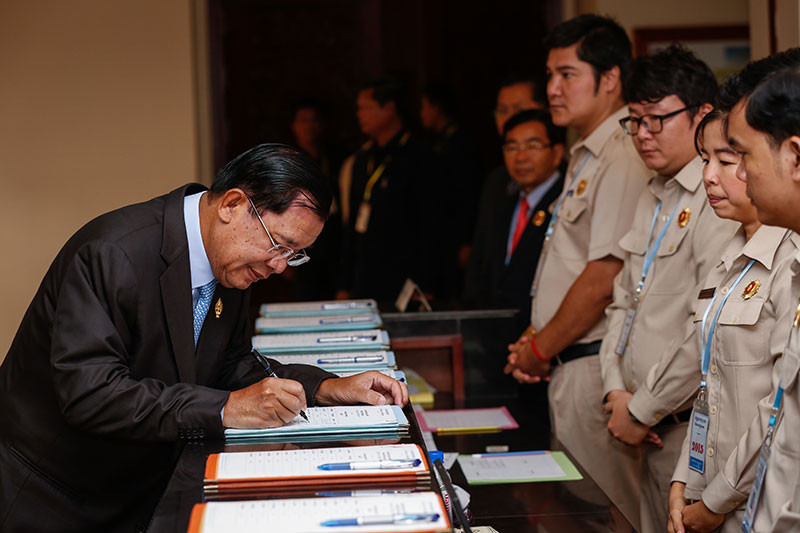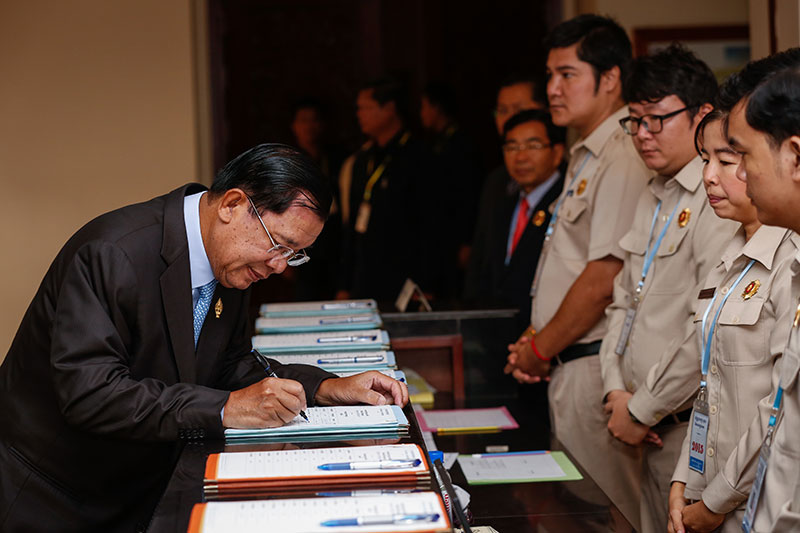With the opposition CNRP boycotting Monday’s sitting of the National Assembly, the ruling CPP took advantage of their exclusive presence in the chamber to unanimously push through three separate bills with minimal discussion or debate.
Sitting from 8 a.m. to 3 p.m., 66 of the CPP’s 68 lawmakers approved the national budget for 2016, the statistics law and the telecommunications law, with the lawmakers speaking briefly of the merits of each bill before passing them.

The pace of the parliamentary passage was blistering compared to other sessions of the Assembly held this year with the CNRP’s 55 lawmakers, whose interjections have sometimes meant that laws are debated for multiple days.
Yet CPP lawmaker Chheang Vun said there was nothing wrong with the quick votes, as the laws had been carefully checked by relevant parliamentary commissions beforehand.
“It was really transparent because the National Assembly passed the laws with the 68 lawmakers who represent the people nationwide,” Mr. Vun said after the day’s sitting.
“It’s not the first time the National Assembly has passed three laws in a day. We have done it often, because we already had the discussions in the specialist commissions,” he said.
“No nation debates things during the plenary session. The hearings are done in the commissions, even in the U.S. and France,” he added. “Democracy does not mean you debate in the plenary session.”
Following last year’s political deal, the CPP and the CNRP each control five of the 10 bipartisan Assembly commissions, which deal with specific policy areas like education, defense or women’s issues. Each is supposed to review legislation under its purview.
While the ruling party’s delegation of lawmakers comfortably holds a majority of seats in the 123-member parliament, sessions since last August had also featured the dissenting voices of the CNRP lawmakers.
Yet six weeks ago, two CNRP lawmakers were beaten by pro-CPP protesters, including plainclothes soldiers, while leaving an Assembly session. The violent assault came four days before the CPP ousted deputy opposition leader Kem Sokha as the body’s vice president.
Then, opposition leader Sam Rainsy was ordered arrested last month and promptly stripped of his status as a lawmaker. As a result, the CNRP on Sunday announced an indefinite boycott of Assembly sittings until their safety is assured and cooperation is restored.
The CPP seemed unfazed on Monday. During his speech on next year’s budget, which includes a 12.3 percent increase in spending to $4.27 billion next year, Finance Minister Aun Porn Moniroth said that the government was getting on with the job.
Mr. Porn Moniroth said that rapid development in Cambodia forced the CPP government to increase public borrowing next year to about $960 million from about $822 million this year to help fund the budget.
“The increase in borrowings is to offset the decrease in grants from the development partners due to there being more development in Cambodia, which makes the development partners turn to concessional loans instead of grants,” the finance minister said.
Cambodia is projected to graduate from the World Bank’s “low income” to “lower middle income” status this year as it passes a gross national income figure of $1,045 per capita, reducing its preferential access to aid.
The increase in borrowing, along with recent reforms to tax collection, will help pay for the 12.3 percent spending increase next year, which also includes a 28 percent increase for education, to almost half a billion dollars, and a 17 percent increase for defense, to about $379 million.
Yet Defense Minister Tea Banh told reporters while leaving the Assembly session that he did not believe his ministry had hit pay dirt, explaining that the majority of the increase would be going toward staff and soldiers.
“Comprehensively checking the budget, I don’t see any growth in the defense sector,” General Banh said. “We will just mainly be increasing the salaries.”
Across Phnom Penh at the CNRP’s headquarters in Meanchey district, the opposition on Monday held its own talks on the 2016 national budget under the chairmanship of Acting President Pol Ham, with both Mr. Rainsy and Mr. Sokha currently abroad.
Mr. Rainsy is presently in self-imposed exile in Europe to avoid arrest. CNRP spokesman Yem Ponhearith said after the meeting that he was not sure where Mr. Sokha was, but that the party had decided that its lawmakers would not have supported the budget.
“In the national budget for 2016 we have seen some positive and negative points,” Mr. Ponhearith said, pointing to increases in foreign borrowing as one of the problems with the budget.
“We need revenue and loans to be balanced,” he said. “The better balance would be to collect [revenue] thoroughly and tax properly, and reduce unnecessary expenses…. In short, we cannot support this draft law.”
Mr. Ponhearith said he regretted that the CNRP could not attend the Assembly and called on the government to assure the opposition lawmakers’ safety and return to a spirit of parliamentary cooperation soon.
Fellow CNRP lawmaker Eng Chhay Eang was more flippant, posting a statement to his Facebook page in the afternoon describing the National Assembly session as flavorless without the opposition.
“This National Assembly meeting today without the presence of the CNRP lawmakers can be compared to a soup that only has water and fish, and has no salt, vegetables, or any other ingredients,” Mr. Chhay Eang wrote.
(Additional reporting by Mech Dara)




